Sommaire
Media and community managers are trapped in a black box until they suffocate inside.
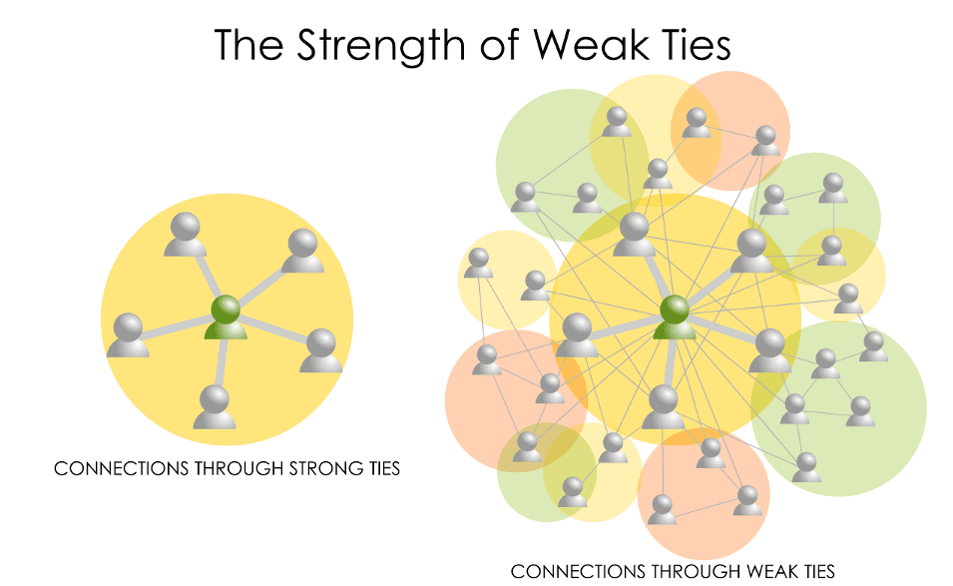
Facebook has decided to separate messages from friends from page posts. The announcement caused the company's share price to fall by no less than 5%. The shift is a global one, and it puts the media and community managers in a particularly uncomfortable position. They have been caught up in the black box game to the point of being locked inside, which could suffocate them.
I. Lessons from Facebook
First and foremost, a defeat for the algorithm
In the end, if it comes down to it, it's a gentle admission of the failure of Facebook's algorithm. If it were so relevant and so strong, it would be capable of ingesting all the information at its disposal to give us access to the most relevant content: it is nothing of the sort.
According to the only indicators that count for Facebook, namely time spent on the site and per session, the platform is in decline. In 2016, according to statistics obtained by Le Blog Du Modérateur, the average time spent on the site was 32h43 per month. In 2017, this dropped to 18 hours 24 minutes. As for sessions, they dropped from 311 to 173 sessions. Only the average time per session increased by 5 seconds.
Fewer sessions, less time spent on the site, means fewer opportunities to receive advertising. Less advertising means less potential sales. While Facebook remains in first place, it needs to take this into account, as it will have a direct impact on its growth. The social network with the dark blue logo can still tell investors that its user growth figures had risen to 2.07 billion by the end of 2017, compared with 1.88 billion a year earlier, but it won't be able to do so forever. It must therefore prepare to review other KPIs that will be more important once the rate of active users has reached a floor.
An underlying ideology: family and strong ties
The other lesson is that one of the companies with the most data on users is leaning ideologically rather than statistically. Network science and sociology have extolled the strength of weak ties, where the strength of your network comes from people who are far away from you, who take you out of your own bubble, and out of your own resources. But Facebook chooses a different path, that of strong links. According to the digital behemoth, your desire on social networks and the internet is not to explore new lands, but to maintain contact with the people who matter to you. In the end, this vision is strongly influenced culturally by the religious model, which says that family prevails over all else.
But Facebook chooses a different path, that of strong links. According to the digital behemoth, your desire on social networks and the internet is not to explore new lands, but to maintain contact with the people who matter to you. In the end, this vision is strongly influenced culturally by the religious model, which says that family prevails over all else.A decision that will further undermine its fight against fake news
This status will make it easier to maintain our bubbles and stay stuck in them. Because fake news may sometimes be created by Facebook pages, but these are :
- Spread by people. Maybe even people close to you. Separation won't change a thing.
- With very little impact. This fake news propagated by installed pages is not an operation run from start to finish by foreign states. They don't need an official page. All they have to do is find the right network to spread their creations. In fact, they will simply pay the platform to target the right community, and won't need a Page to do so.
Similarly, Facebook's solution of offering other articles related to the subject is pointless window dressing. Fake news is about making you believe in a pink unicorn with three legs. As no media outlet has covered the three-legged pink unicorn before, only other articles from other biased fields will talk about it and further compartmentalise the impression that it is real and that we are being kept in the dark. This is nothing new: we were already talking about it with Google. As only conspiracy theorists talk about conspiracies, querying the search engine will only take you back to the same place.
Finally, the most tragic thing is that I have little hope of Facebook's ability to make clickbait content less visible. While algorithms can identify "the 3rd will amaze you" or "like the page and share with your friends", it's a completely different story for teaser content, which will always get more likes or shares than a business article in the New York Times. In fact, the "if you like it, it means you want more" model is totally counter-productive in that it's easier to engage with trivial things than with raw articles based on facts.
II. Lessons for community managers and the media
The community manager and the black box
The community manager has long been locked in a black box. He has even completely forgotten the consequences. Facebook is a system that doesn't explain the process that takes place once a publication has been published. 3 years ago, I set myself the challenge that the community manager had to get out of the dictatorship of the numbers in which he has himself become entangled.The fact was that community managers were less and less aware of the platforms they were using. From the Edge Rank to the Twittos' connection, he could no longer know what happened to the message once he had introduced it into the platform. This well-known cybernetic and systemic schema is that of a black box. A black box deliberately organised by the networks.The community manager enters a message (input) into a system (Facebook, Twitter, etc.) and has no idea what happens to it. The only feedback they receive are likes, favourites and shares. As a result, they only feel they are doing a good job when they receive engagement.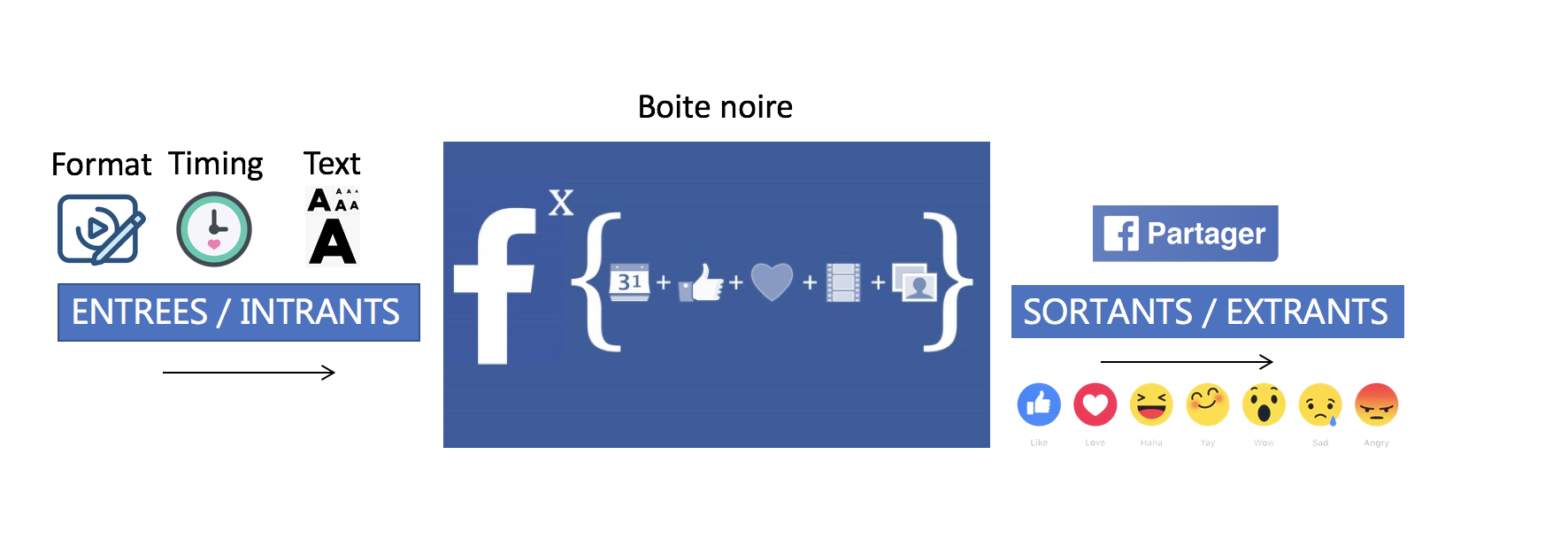 As a result, the community manager will focus purely and simply on the extracts and try to modify the variables of his inputs in every conceivable way.
As a result, the community manager will focus purely and simply on the extracts and try to modify the variables of his inputs in every conceivable way.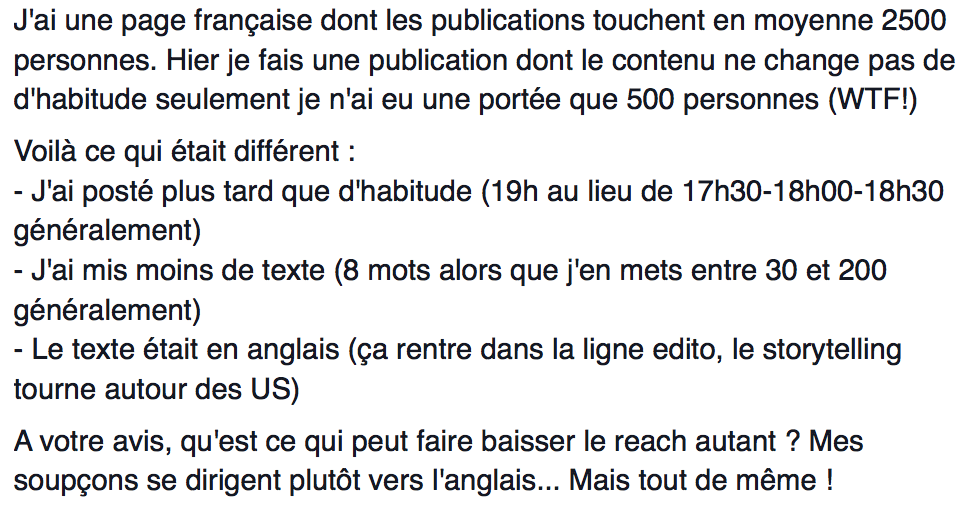 They will be on the lookout for the ideal time to publish. (With biased studies, which will create a motorway effect, i.e. the simple fact that all the community managers publish at the same time creates a total traffic jam) He will also focus on the form that his messages take. The form as much in the different messages he gives and thinking that this has an impact on 'reach'. (With the chimera of 6% reach as cheese on the cake)
They will be on the lookout for the ideal time to publish. (With biased studies, which will create a motorway effect, i.e. the simple fact that all the community managers publish at the same time creates a total traffic jam) He will also focus on the form that his messages take. The form as much in the different messages he gives and thinking that this has an impact on 'reach'. (With the chimera of 6% reach as cheese on the cake)
Finally, the format (use of an image, video, etc.) is also at the centre of attention. There are many myths about the content that Facebook would like to push.
 It wouldn't be so tragic if the community manager wasn't completely consumed by the complexity of the outputs.
It wouldn't be so tragic if the community manager wasn't completely consumed by the complexity of the outputs.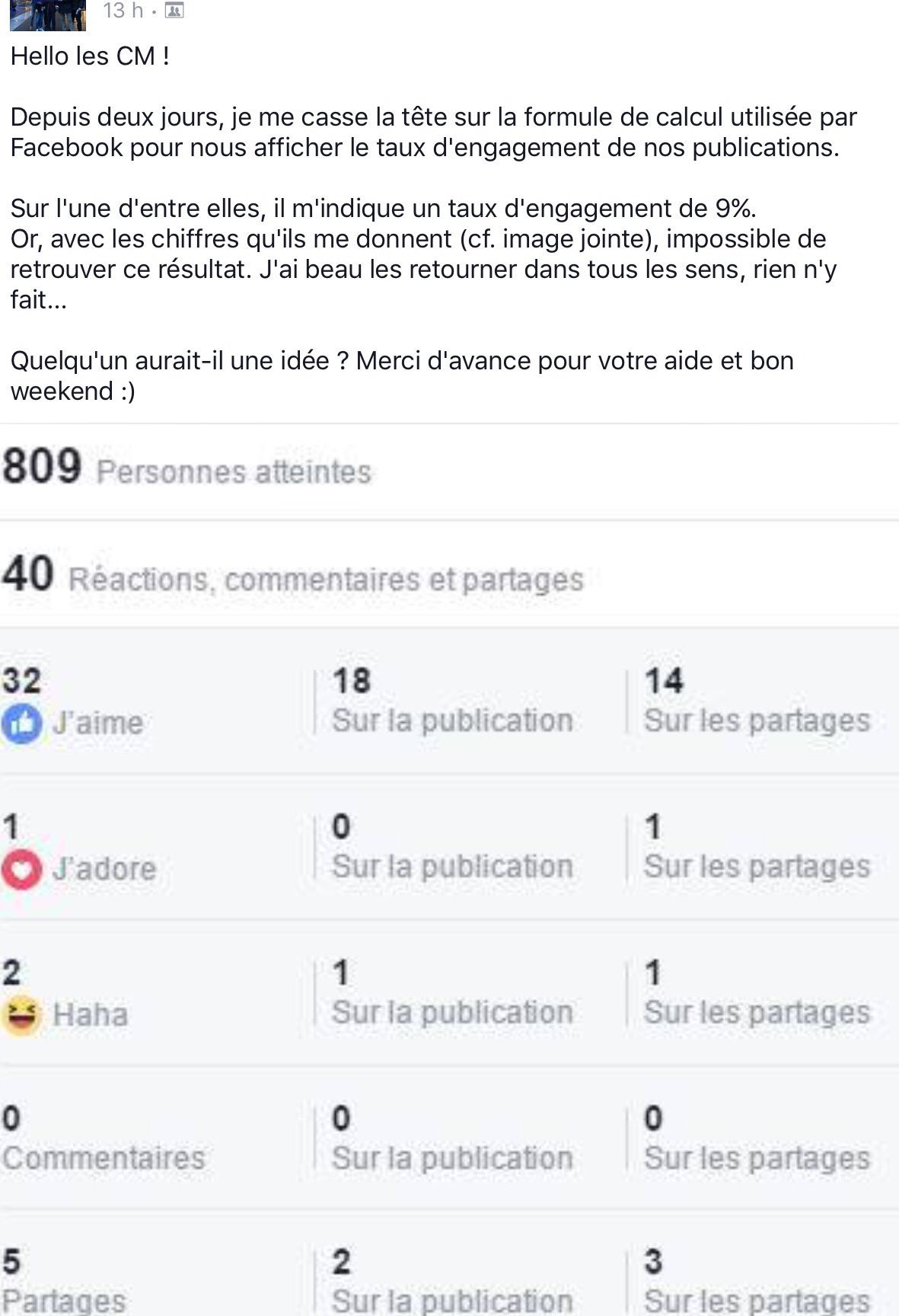
And also if Facebook didn't cheat on the output indicators. Facebook is no stranger to cheating on its measurement indicators. It was largely thanks to this that it managed to impose the publication of native videos to the detriment of YouTube videos. It cheated on view metrics, which meant that people who used YouTube videos had the impression that they were viewed less.
In fact, a message that no longer generated any engagement would, in the eyes of the community manager, no longer serve any purpose in terms of meeting marketing objectives. This situation has created a system in which community managers focus more on KPIs than on their marketing objectives: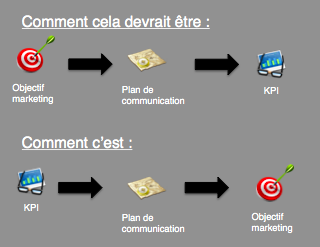
The sad thing is that this observation is corporate. You want to be a good community manager? You need to get engagement. You need to be able to compare your reach with your peers. They don't compare market share, awareness or brand knowledge. They are content with the virtual currency provided by Facebook.
And for good reason: Facebook needs likes and engagements, because they leave a trace of past behaviour about a user. Its business model is based on this. You need traces to define a user so that you can offer them the right content.
A user who doesn't engage is a useless user. For Facebook, we need to be able to 'qualify' them: put them in boxes. Because without a box, they won't be included in the multiple indicators introduced by brand Ads managers.
The equation is simple: if users log on for less time, and come less often. Their capacity to ingest advertising is diminished. Consequently, if the pool of users around a profile category is small and weak, demand becomes stronger than supply. The price then rises. As the price rises, competition comes into play: Facebook is no longer as prolific as another advertising network in terms of cost per GRP. Other advertising methods will therefore be preferred.
Facebook therefore needs as many qualified users as possible, who engage with content, themes and behaviours, so that it has a maximum audience to offer advertisers. To achieve this, users of the platform, brands, media and others need to 'work' for Facebook to help it categorise itself. As each Page indicates the theme to which it belongs, its activity actually serves Facebook's game. They should therefore be rewarded.
To do this, likes, shares and "emotions" are offered as rewards. But these are all virtual currency. A like, a share or an emotion has never increased sales. What a company pays a community manager for is not to entertain a gallery or get likes, but to give the organisation that employs them a strategic advantage. To forget this is to misunderstand the job.
Suffocated by the black box, the advertiser's community manager will be an endangered species.
The fact is that paying the right price for a community manager is going to become a luxury for a number of companies. A community manager and his/her employer's expenses cost an average of €40,000 in the Paris region. While this sum may be negligible for a large group, it's a completely different story for an SME. In Belgium and Switzerland, the same applies to large brands, given the small size of the country. A few years ago, community managers were the talk of the town. I remember buzzing article headlines like "Tomorrow, the community manager will be the best paid job in your company". Then it was no longer the CM who was in vogue, but the Social Media Manager. It quickly became too small. The whole Web had to be targeted. We then spoke of the CDO (Chief Digital Officer) or Growthacker.
The fact is that, in my view, the community manager was a necessary transition, given that the communicators of the time were out of their depth. The fact remains that I no longer understand this dichotomy between offline and online.
Admittedly, technical details don't always win the approval of traditional communicators. But this appropriation should be taught in schools by now. But it still isn't. Digital training courses are still being given, where lazy or ignorant teachers are content to give an overview of the social media available to communicators, without forgetting the age-old slide of ranking countries by their population, with social media inside.
But this digital world is our world. There is no longer any distinction. We need a community manager who understands the world of marketing and communication, just as we need communicators who understand the digital world. The community manager's KPIs mean that traditional communicators regard them as UFOs, while the latter's lack of understanding means that community managers do not regard themselves as communicators.
In the future, my conviction is that there will still be community managers, but that they will be in agencies, and that communications directors will have to master the digital codes, because this will be an integral part of their missions, particularly in SMEs.
Stockholm syndrome in traditional media
Also caught up in the digital transition, the media have been chasing technology. They chased websites. They chased Google. Now they're chasing social networks. Until they became dependent on them. In fact, they have become dependent on them.
- For the most part, half of their traffic comes from social networks, led by Facebook.
- Some of them use tools written by Facebook, such as Instant Articles.
- They have received additional financial resources as a result of their recruitment as underlings in the treatment of fake news. And when I say underling, I think they were right to do so and that it is a responsible action. However, it is fair to call them underlings in that they are doing the job that Facebook should be doing, while at the same time using their reputation and power of influence to protect the social network.
Specialists say that we are now entering through the window instead of the door to explain the place of social networks in the information chain and traffic on social networks. In fact, the sites that depend on traffic are the ones that are most at risk. Those that have developed an audience will have a mattress to cushion the blow.
This change, distilled drop by drop, has enabled Facebook to negotiate with very significant leverage. This has enabled it to negotiate content production, video and live content, as Nicolas Becquet revealed. So today it is the traditional media that will take the biggest hit from this change of timeline.
III. Conclusion
Although I've been particularly scathing about the media and community managers, I'm going to come as a bit of a surprise when I write my conclusion.In my opinion, Facebook is playing a dangerous game.- If pages organically desert the platform, it will have less information about its users. It will therefore be less able to qualify its users. The same goes for the media, because if Facebook alienates the media, it will lose a large proportion of its qualified content. The platform would be left with bullshit stories like Minute Buzz. However, I have little hope that this rebellion will ever happen.
- If I think Facebook is playing a dangerous game, it's particularly because of its legislative agenda insofar as Facebook is under attack in the area of fake news. In this area, in Europe, the journalists' and media lobby is particularly powerful, as demonstrated once again by the appointment of the expert group on the issue. The economic benefits of a platform benefiting the local economy are also particularly important. If these two levers were to come under pressure, Facebook could lose enormously. What's more, its decision will promote fake news. Journalists and economic powers could then have a very important lever to use to obtain more room for manoeuvre.
In any case, whether you are Facebook, media or community manager, we are currently at a turning point. A turning point that could define the future of one of the three players.



